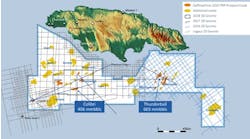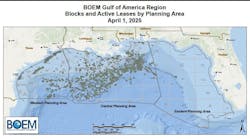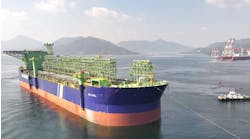US Representatives cross aisle to oppose seismic permitting in Atlantic
Offshore staff
WASHINGTON, DC- Today, US Representatives Mark Sanford (R-SC) and Gerry Connolly (D-VA) joined in sending a letter signed by 53 other members of the US House of Representatives to President Obama. It requested a halt to the permitting process for potential seismic testing in the Atlantic Ocean.
In March, the US Department of the Interior and the US Bureau of Ocean Energy Management (BOEM) announced the proposal for the nation’s outer continental shelf (OCS)oil and gas leasing program for 2017-2022. The proposed program excluded the Atlantic coast after a portion was previously included in January’s draft. Factors cited in the decision included: “significant potential conflicts with other ocean uses such as the Department of Defense and commercial interests; current market dynamics; limited infrastructure; and opposition from many coastal communities.”
Despite the fact that the Atlantic is not currently on the table, however, several permits to acquire new seismic data off the Atlantic coast are still sitting with theBOEM following its July 18, 2014 record of decision for the environmental review of geophysical activities offshore the US Atlantic coast.
According to the BOEM, eight companies have submitted geological and geophysical permits in the Atlantic OCS.
“If one is not going to do something, it doesn’t strike me as reasonable to prepare to do that something. Accordingly, it makes little sense to conduct seismic testing off the Atlantic coast, when the Atlantic Ocean has been excluded as a possible site for offshore drilling by the Department of Interior,” Sanford said in a statement. “It should not move forward, if nothing else, because allowing seismic testing to proceed goes counter to thecoastal communities I represent. They have spoken clearly that they do not want this blasting.”
“I’ve repeatedly made the case that drilling off Virginia’s coast poses significant and irreversible consequences to Virginia’s economy, jeopardizes the Defense Department’s presence in the region, and threatens our coastal communities and natural resources,” said Connolly. “The Department of Interior’s decision to remove the Atlantic from offshore oil and gas exploration was the responsible thing to do. Moving forward with seismic testing is unnecessary and would threaten the progress we’ve made to protect our coastal communities.”
In response, president of the National Ocean Industries Association Randall Luthi told Offshore: “The letter is not based on science or practice. The fact is that seismic surveys have been conducted safely in the world’s oceans for many decades, not only to search for oil and natural gas, but also to locate underwater structures, discover shipwrecks and to determine suitable sites for offshore wind turbines.
“I doubt that most of those calling for a ban on seismic surveying have ever been onboard a seismic vessel to witness first-hand survey operations which include stringent measures to avoid and mitigate environmental impacts, such as the required gradual ramping up of sound levels and the required presence of trained marine mammal observers who scan the survey area so that operations can be halted if marine mammals are seen nearby,” he continued.
“Seismic surveys are not new to the Atlantic OCS; they have been conducted periodically over the past 50 years with no reported injuries or significant disturbances tomarine life. Seismic research ensures future decisions on leasing and drilling are well-informed and not made blindly.”
NOIA is not alone in its opposition to this topic. In January, the International Association of Geophysical Contractors (IAGC) urged the bureau to act on the permits.
“IAGC strongly urges the administration to act quickly and efficiently to process the survey permits pending since last July when BOEM authorized G&G exploration in the mid- and south Atlantic OCS,” Ken Wells, then-president of IAGC, said at the time. “These G&G surveys will identify areas that may hold recoverable oil and gas reserves and areas that may not, and will enable leaders to make informed decisions on how to best utilize these resources to ensure the nation’s future energy security.”
Earlier this year, the API pointed to a number of officials that were on the record as supporting the inclusion of the Atlantic OCS, including Senator Marco Rubio of Florida, US Senator David Perdue of Georgia, Governor Pat McCrory of North Carolina, US Senator Tim Scott of South Carolina, and US Senator Mark Warner of Virginia are supporting offshore oil and natural gas development in the Atlantic.
In a statement released just prior to March’s lease sale announcement, IAGC Chief Operating Officer and Executive Vice PresidentWalt Rosenbusch noted that data suggesting a lack of resources was based on seismic data more than 30 years old.
“Had the administration moved forward – granting the authorizations to acquire new seismic data – they would have data that would better define the resource potential on the Atlantic OCS,”Rosenbusch said. He also pointed to the Gulf of Mexico as an example that geophysical activities could co-exist with other oceanic-based industries’ operations.


